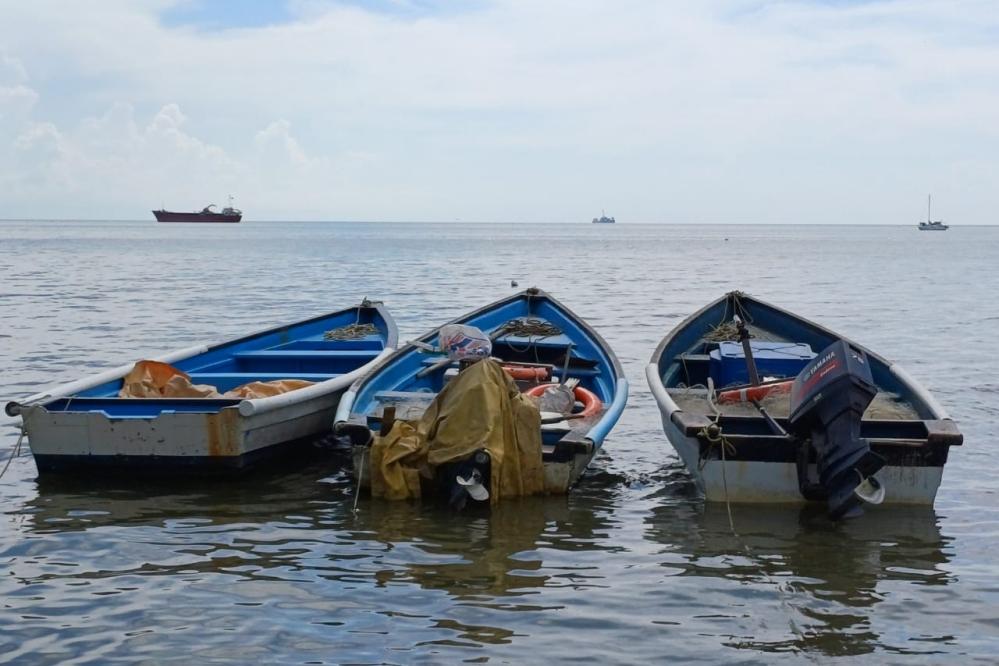At the Otaheite fishing depot on Trinidad’s west coast, fishers are busy gutting their morning catch on tables. Mounds of conch and small bait are stacked as wooden canoe-like fishing boats bob idly offshore.
On a day as clear as this, the mountains in Venezuela are visible on the horizon, so close is the island to the South American mainland. The Gulf of Paria, which separates the two countries, is deceptively calm. But many in the Caribbean fear a coming storm.
The US sent eight warships and a submarine to the southern Caribbean last month, in what the Trump administration said was a mission to fight drug trafficking. The White House says the flotilla has destroyed three speedboats it claims were carrying drugs, killing at least 17 people.
Related: Trump’s killing of 11 alleged Venezuelan drug traffickers sets a dangerous precedent | Kenneth Roth
UN experts and human rights groups have described the US attacks as extrajudicial killings, and Caribbean governments which belong to the Venezuela-backed Bolivarian Alliance for the Peoples of Our America (Alba) trade bloc – have condemned the US deployment as a “flagrant violation” of international law. The issue is likely to feature prominently on the agenda when world leaders meet at the UN general assembly in New York this week.
Other countries in the region have been more supportive, however: the Dominican Republic navy had worked alongside US forces to locate the third boat which was struck late on Friday, killing three people. While Guyana’s president, Irfaan Ali, has urged caution, but he told the Guardian that his government supported any action “to crush transnational crime and illicit activities”.
Trinidad and Tobago’s prime minister Kamla Persad-Bissessar has also welcomed the US naval presence, but fishers in Otaheite say it is forcing them to become more cautious.
Phillip, 30, has been fishing for more than 18 years, and said he has no plans to stop. But, he was concerned that Trinidadians could get caught up in the violence. “Venezuela, they warring Trump so it come like they warring we as well. It hard to take the risk because you not sure if they will attack we or not,” he said.
Rhetoric from the US has further stoked fears that fishers could become collateral damage, with Trump admitting that the warships are probably “stopping some fishermen too”, and JD Vance later added that he himself would not go fishing in the Caribbean.
Officials In Trinidad and Tobago have tried to reassure the public. Tobago’s chief secretary, Farley Augustine, said the US was not operating in Tobago’s waters and that fishers who had previously complained about intrusions into their waters should feel safer now. “They should be the happiest now because it means there is a deterrent,” he said.
Augustine was echoing Persad-Bissessar’s sentiments. Unlike many other Caribbean governments, which have characterised the US military exercise a threat to peace and security, the prime minister expressed support for the US action. She insists the US intervention can only help Trinidad and Tobago, which last year was among the most violent countries in Latin America and the Caribbean, and told reporters that the only people who are against this action are those who benefit directly or indirectly from the illegal drug trade.
But along Trinidad’s north coast, where locals and tourists gather at Maracas Bay and Las Cuevas, boats now stay closer to shore. Instead of their usual route, heading west, toward Venezuela, they now head east, staying close to the coast of Trinidad.
“Nobody wants to take the chance,” said one local.
At the Claxton Bay fishing depot on the west coast, Hopsing, a veteran with 40 years at sea, said the US military presence had at least one positive impact. “Pirates used to be a problem but that go stop now. You have boats watching over you. The coast guard doesn’t do anything. Trinidad has no good police, no good army,” he said.
Dave Johnson, a fisher in the town of Mayaro said he feared the possible consequences.
“We as a country never had a problem with Venezuela. Now with these comments in the media, some fishermen are afraid to take the chance to go where they normally go … We don’t want war to escalate,” he said. For Johnson, the issue is bigger than money. “If we didn’t have fishermen how would we eat fish? The fishing community gives back a lot.”
Related: Trump’s Venezuela gunboat diplomacy: sabre-rattling or prelude to invasion?
Local economists have warned of ripple effects if Trinidad’s fishing slows down. The Central Statistical Office reported fish prices in August were 9.5% higher than a year earlier. Dr Vaalmikki Arjoon said any sustained cut in trips could make supplies more volatile. “It would be wrong for the coast guard or military to impede the lawful activities of fishermen, who rely on their daily catch for survival,” he said.
The industry earned TT$83.6m ($12.3m USD) in exports last year, with a five-year average above TT$90m ($13.3m USD). Though just 0.6% of GDP, the fishing industry is vital to rural communities. Arjoon warned disruptions would bring both economic and social costs, from rising wholesale and retail prices to higher vessel insurance.
The restaurant sector is also watching closely. Umesh Meena, chef and owner of the upscale Meena House, said supplies had not yet been affected but he was concerned. “Fishermen are being more careful about how far they go. If this prolongs, it could affect availability and push prices upward,” he said.

